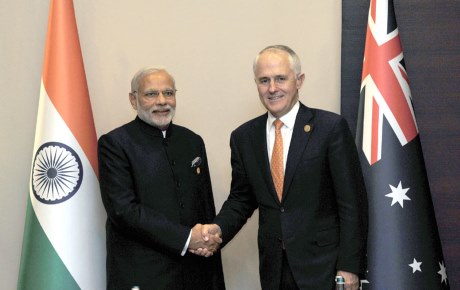The prime ministers of India and Australia have announced the completion of procedures necessary for a bilateral nuclear safeguards agreement between the two countries to enter into force.
 |
| Prime Ministers Modi and Turnbulll meet on the sidelines of the G20 (Image: Prime Minister of India) |
Prime Ministers Narendra Modi and Malcolm Turnbull announced the completion of procedures, including administrative arrangements, for the India Australia Civil Nuclear Agreement in a meeting held on the sidelines of the G20 summit in Antalya, Turkey. According to a statement from the Prime Minister of India's office, Modi thanked Turnbull and said the nuclear agreement was "a milestone and source of trust and confidence".
The bilateral agreement was signed in September 2014 during a state visit to India by Tony Abbott, Australia's prime minister at the time. The agreement will open the door for Australian uranium to be exported for use to fuel India's nuclear power plants.
All of Australia's uranium production - over 5000 tU in 2014 - is exported under strict controls to ensure that it is only for civilian use. Australia is a signatory of the Nuclear Non-Proliferation Treaty (NPT), but also requires any countries to which it sells uranium to put in place a rigorous bilateral safeguards treaty.
Earlier this year, Australia's Joint Standing Committee on Treaties (JSCOT) recommended that the bilateral agreement should be ratified but urged that uranium sales to India should only begin after concerns about non-proliferation, nuclear regulation and safeguards had been addressed, including India's establishment of an independent nuclear regulator.
India, with an ambitious nuclear power program but few indigenous uranium resources, is not a signatory of the NPT. It was effectively isolated from world nuclear trade until 2008, when it signed a safeguards agreement with the International Atomic Energy Agency and the 45-member Nuclear Suppliers Group agreed to exempt the country from rules prohibiting trade with non-members of the NPT. Since then, India has signed nuclear cooperation agreements with several countries.
In April, Canadian uranium producer Cameco signed its first contract with India after the nuclear cooperation agreement between Canada and India came into force in September 2013. According to the Canadian government, the contract to supply 7.1 million pounds of uranium concentrate (about 2730 tU) to India's Department of Atomic Energy was worth around CAD 350 million ($286 million).
Researched and written
by World Nuclear News














